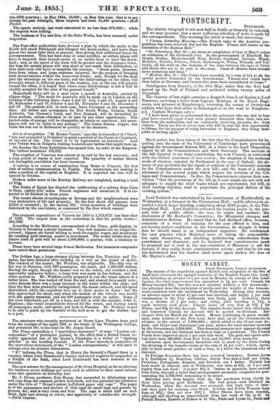Much notice has been taken of the fact that the
Commissioners for in- quiring into the state of the University of Cambridge have pronounced against the Government Reform Bill, in a letter to the Lord Chancellor, signed by all the Commissioners and their Secretary. The sections in the bill objected to are those constituting the new Council, as contrasted with the Oxford enactment of last session ; the adoption of the sectional mode of election, rejected by Parliament in the case of Oxford; the ab- sence of any provision for the repeal or revision of the•University statutes by the Commissioners under the new bill; and the want of a definite statement of the several points which require the revision of the Col- leges and Commissioners. In fine, the Commissioners express their con- viction "that the provisions of the bill as it now stands are not only not adequate to supply the chief wants which are experienced, but will, in their leading features, tend to perpetuate the principal defects of the existing system."
•
Lord Goddrich was entertained by his constituents of Huddersfield, on Wednesday,-at a banquet in the Gymnasium Hall ; andlre afterwards at- tended a much larger meeting, comprising about 2000 people, in the Phi- losophical. Hall. Lord Goderich reviewed the leading points in the pre- sent state of public affairs: the war, its origin and conduct ; the disclosures of Mr. Roebuck's Committee; the Ministerial changes, and Administrative Reform. He stated that he had declined office' because, conscious of a want of training for the post offered to him and not having perfect confidence in the Government, he thought it better that he should stand as an independent supporter. He condemned the easy practice which Ministers have of taking the responsibili- ties upon themselves, and shielding misbehaving subordinates from punishment and dismissal ; and he declared that constituencies must be prepared not to wait in the ante-chambers of Ministers to ask for favours, if they really desire administrative reform; and that he for one has determined that his shadow shall never again darken the door of Mr. Hayter's office.


























 Previous page
Previous page